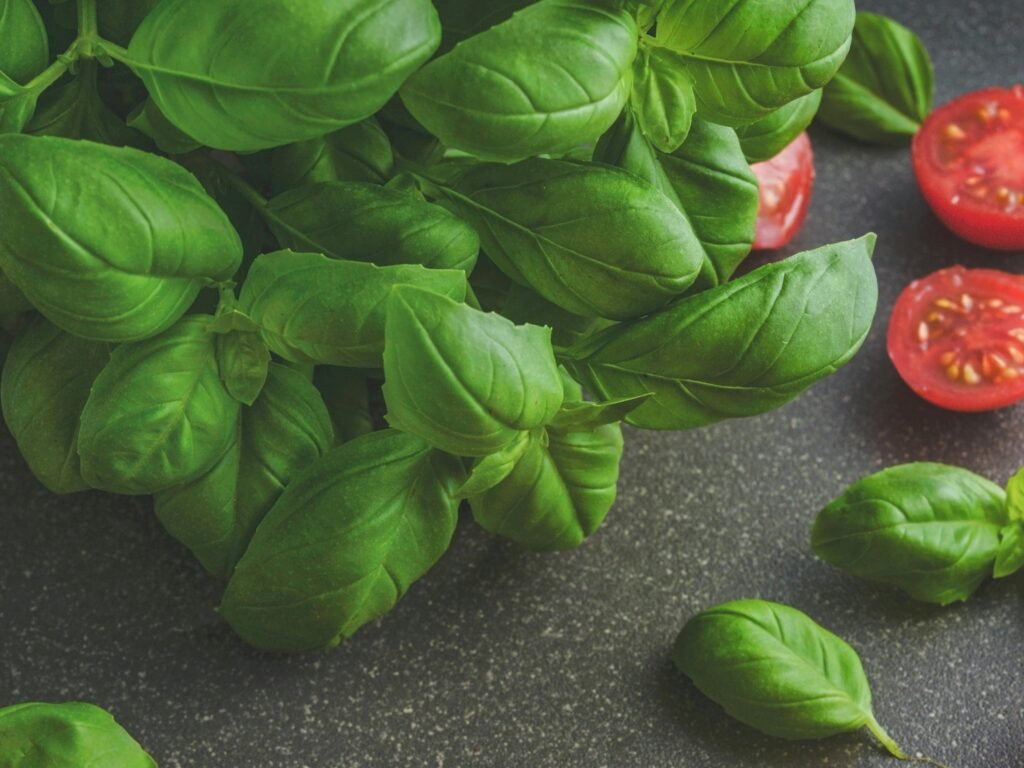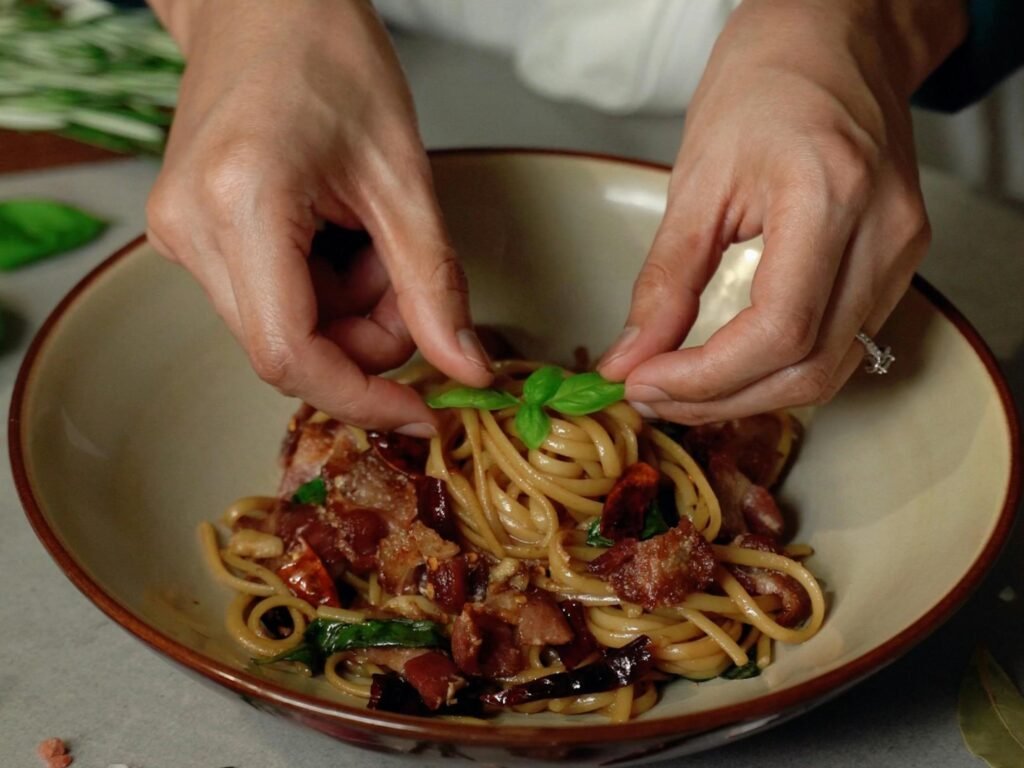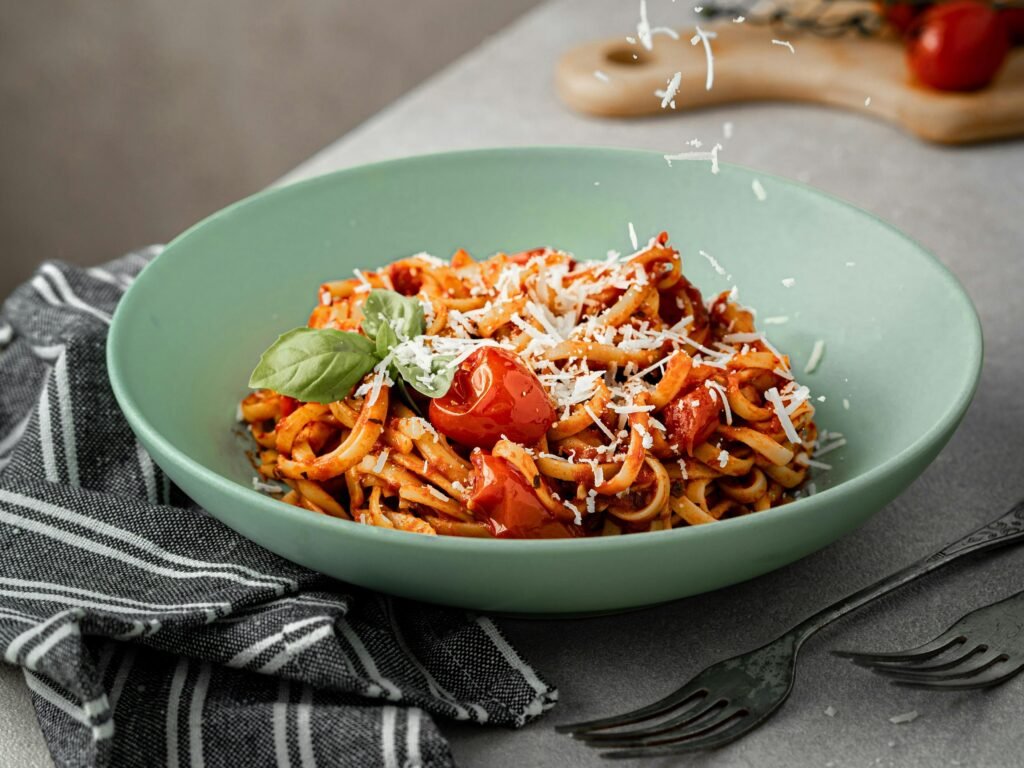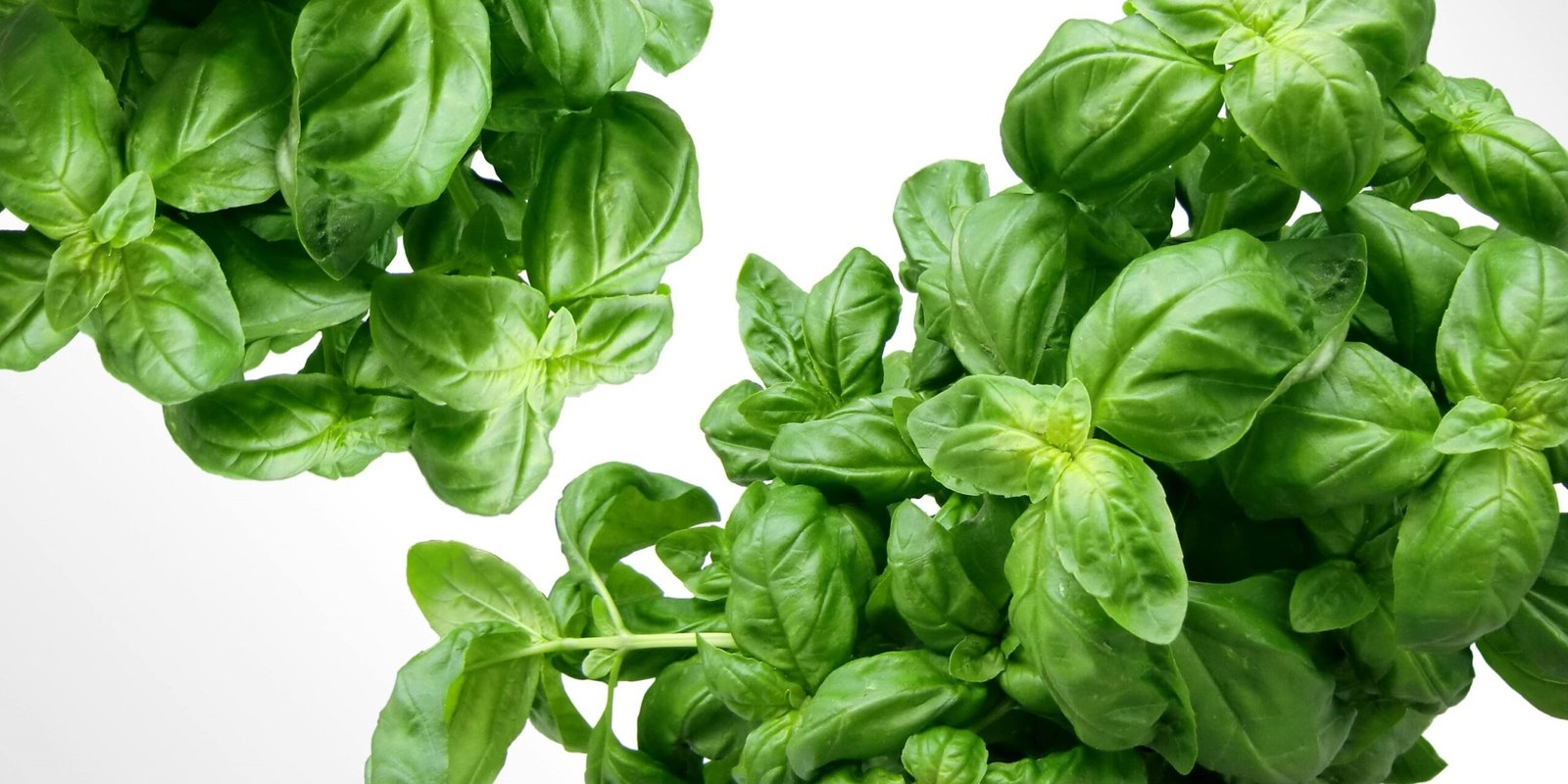Table of Contents
Nestled among the culinary herbs prized for their aromatic allure and medicinal properties, basil stands out as a versatile and beloved herb with a rich history. In this journey, we delve into the nutritional richness and therapeutic potential of basil, uncovering its profound impact on health and well-being. From its antioxidant properties to its role in digestive health and beyond, basil offers many reasons to incorporate it into your daily diet and lifestyle. Join us as we unravel the secrets of basil and discover how this humble herb can elevate not only the flavour of your dishes but also your overall health and vitality.
Basil, scientifically known as Ocimum basilicum, is believed to have originated in India, where it has been cultivated for over 5,000 years. From India, basil spread to other parts of Asia, including China, Thailand, and Indonesia. Its aromatic leaves and pleasant flavour made it a popular herb in ancient civilizations, including those of Greece, Egypt, and Rome.
The word “basil” is derived from the Greek word “basileus,” meaning “king” or “royal,” reflecting the herb’s revered status in ancient cultures. Basil was often associated with royalty, divinity, and protection against evil spirits. It was used in religious rituals, as well as in culinary and medicinal applications.
Today, basil is cultivated worldwide and is a staple herb in various cuisines, including Italian, Thai, and Mediterranean. It is grown both commercially and in home gardens, appreciated for its fresh, aromatic leaves and its versatile culinary uses. Beyond its culinary appeal, basil continues to be valued for its potential health benefits and is used in herbal remedies and aromatherapy practices.
NUTRITIONAL VALUE

Basil, a popular culinary herb renowned for its aromatic flavour, also boasts a modest yet notable nutritional profile. A 100-gram serving of fresh basil leaves provides approximately 23 calories and is a rich source of essential nutrients. Basil is particularly abundant in vitamins, including vitamin K, which supports bone health and blood clotting, and vitamin A, important for vision and immune function. Additionally, basil contains significant amounts of vitamin C, an antioxidant that promotes skin health and immune function. Basil leaves also offer essential minerals such as calcium, iron, and magnesium, which contribute to bone strength, oxygen transport, and muscle function.
Moreover, basil contains bioactive compounds such as flavonoids and volatile oils, which may have antioxidant, anti-inflammatory, and antimicrobial properties, further enhancing its nutritional value and potential health benefits. Incorporating fresh basil into your diet can not only add flavour to your dishes but also provide essential nutrients to support overall health and well-being.
HEALTH BENEFITS

Basil, beyond its culinary charm, offers an array of potential health benefits due to its rich nutritional profile and bioactive compounds.
ANTIOXIDANT ACTIVITY
Basil is rich in flavonoids, polyphenols, and other antioxidants that help neutralize harmful free radicals in the body. These antioxidants protect cells from oxidative stress, reducing the risk of chronic diseases such as heart disease, cancer, and neurodegenerative disorders like Alzheimer’s disease.
ANTI-INFLAMMATORY EFFECTS
Basil contains volatile oils, including eugenol, linalool, and citronellol, which possess anti-inflammatory properties. These compounds help reduce inflammation in the body, potentially alleviating symptoms of inflammatory conditions such as arthritis, asthma, and inflammatory bowel disease.
HEART HEALTH SUPPORT
Basil may promote cardiovascular health by lowering blood pressure, reducing cholesterol levels, and improving blood vessel function. The flavonoids and magnesium in basil help relax blood vessels, improving blood flow and reducing the risk of hypertension and heart disease.
ANTIMICROBIAL PROPERTIES
Basil contains compounds such as eugenol and citronellol, which exhibit antimicrobial activity against bacteria, fungi, and viruses. These antimicrobial properties may help prevent infections and support immune function, protecting against pathogens and promoting overall health.
DIGESTIVE AID
Basil has been used traditionally to support digestive health and alleviate gastrointestinal discomfort. Its essential oils may help stimulate the secretion of digestive enzymes, promoting efficient digestion and relieving symptoms of indigestion, bloating, and gas.
COGNITIVE FUNCTION
Some research suggests that basil may have cognitive-enhancing effects due to its antioxidant and anti-inflammatory properties. Regular consumption of basil may help improve memory, concentration, and mental clarity, supporting brain health and cognitive function.
STRESS REDUCTION
Basil contains compounds like linalool, which have been shown to have calming and stress-relieving effects. Inhaling the aroma of basil essential oil or consuming basil-infused teas may help promote relaxation, reduce anxiety, and improve overall well-being.
BLOOD SUGAR REGULATION
Preliminary studies suggest that basil may help regulate blood sugar levels and improve insulin sensitivity. Compounds found in basil, such as polyphenols and flavonoids, may enhance glucose metabolism and reduce the risk of diabetes complications.
SKIN HEALTH
Basil essential oil is used in skincare products for its antibacterial and anti-inflammatory properties. It may help treat acne, soothe skin irritations, and promote wound healing, making it a valuable ingredient in natural skincare remedies.
RESPIRATORY SUPPORT
Basil contains compounds that help clear congestion and support respiratory health. Inhaling the aroma of basil essential oil or drinking basil tea may help relieve symptoms of cough, colds, and respiratory infections.
PRECAUTIONS

While basil offers numerous health benefits, there are certain precautions and potential drawbacks to consider, particularly for certain individuals. Here are some detailed precautions and cons associated with basil:
ALLERGIC REACTIONS
Some individuals may be allergic to basil or develop allergic reactions upon exposure. Symptoms of basil allergy may include skin rash, itching, swelling, or difficulty breathing. If you have known allergies to other plants in the Lamiaceae family, such as mint or oregano, you may be more likely to experience allergic reactions to basil.
BLOOD CLOTTING
Basil contains compounds like eugenol, which may have mild blood-thinning effects. While this can be beneficial for cardiovascular health in moderation, individuals taking anticoagulant medications such as warfarin should use caution when consuming large amounts of basil or basil supplements to avoid potential interactions and excessive blood thinning.
HYPOGLYCEMIA RISK
Basil may help regulate blood sugar levels, which can be beneficial for individuals with diabetes. However, consuming large amounts of basil or basil supplements may lower blood sugar levels too much, leading to hypoglycemia (low blood sugar). Individuals with diabetes should monitor their blood sugar levels closely when incorporating basil into their diet and adjust their medication as needed under the guidance of a healthcare professional.
DRUG INTERACTIONS
Basil contains compounds that may interact with certain medications. For example, basil may interfere with blood clotting and could interact with anticoagulant medications such as warfarin. Additionally, basil may affect blood sugar levels and could interact with diabetes medications. If you are taking medication, especially blood thinners or diabetes medication, consult with your healthcare provider before consuming basil or basil supplements.
LIVER HEALTH
Basil contains compounds that may have hepatotoxic effects in high doses, potentially causing liver damage. While this is rare and usually occurs with concentrated forms of basil extract or essential oil, individuals with liver disease or impaired liver function should use basil cautiously and consult with a healthcare professional before using basil supplements or extracts.
SKIN SENSITIVITY
Basil essential oil is potent and may cause skin irritation or allergic reactions in some individuals, particularly when used undiluted or in high concentrations. It’s essential to dilute basil essential oil properly before applying it to the skin and perform a patch test to check for sensitivity. Discontinue use if you experience any adverse reactions such as redness, itching, or burning sensation.
PREGNANCY AND BREASTFEEDING
While basil is generally considered safe for culinary use during pregnancy, there is limited research on its safety in medicinal doses or concentrated forms such as essential oil. Pregnant or breastfeeding women should exercise caution and moderate their consumption of basil, particularly basil supplements or essential oils, to avoid potential adverse effects. High doses of basil may stimulate uterine contractions and could potentially lead to miscarriage or premature labour.
INCORPORATING BASIL INTO YOUR DIET

Incorporating basil into your diet is not only a flavourful way to enhance your dishes but also a nutritious addition that may offer various health benefits. Here are several detailed ways to use basil in your cooking:
- Fresh Basil in Salads: Add fresh basil leaves to your salads for a burst of flavour and aroma. Tear or chop the basil leaves and toss them with mixed greens, tomatoes, cucumbers, and other vegetables. Basil pairs well with balsamic vinaigrette or a simple olive oil and lemon dressing.
- Basil Pesto: Whip up a batch of homemade basil pesto to use as a sauce for pasta, and sandwiches, or as a dip for vegetables. Blend fresh basil leaves with garlic, pine nuts, Parmesan cheese, and olive oil until smooth. Adjust the ingredients to taste and store the pesto in the refrigerator for up to a week.
- Caprese Salad: Create a classic Caprese salad by layering slices of fresh tomatoes, mozzarella cheese, and basil leaves. Drizzle with balsamic glaze and olive oil, and sprinkle with salt and pepper for a simple yet elegant dish that showcases the flavours of summer.
- Basil Infused Oil: Make your basil-infused oil to use for cooking or as a flavourful finishing oil. Place fresh basil leaves in a bottle of olive oil and let it infuse for several days to a week. Use the basil-infused oil to drizzle over grilled vegetables, fish, or bruschetta.
- Tomato Basil Soup: Prepare a comforting tomato basil soup by sautéing onions, garlic, and diced tomatoes in olive oil until softened. Add vegetable broth, fresh basil leaves, and seasonings like salt, pepper, and dried oregano. Simmer until flavours meld together, then blend until smooth for a hearty and satisfying soup.
- Basil Garnish: Use fresh basil leaves as a garnish to add a pop of colour and flavour to your dishes. Sprinkle chopped basil over pizzas, pasta dishes, grilled meats, or soups just before serving for a vibrant finishing touch.
- Basil Tea: Brew fresh basil leaves in hot water to make a fragrant and soothing herbal tea. Simply steep a handful of basil leaves in boiling water for a few minutes, then strain and enjoy. You can also add honey or lemon for sweetness and extra flavour.
- Basil in Stir-Fries and Curries: Add fresh basil leaves to stir-fries, curries, and Asian-inspired dishes for an aromatic twist. Toss basil leaves in towards the end of cooking to preserve their flavour and freshness. Basil pairs well with ingredients like garlic, ginger, soy sauce, and coconut milk.
- Basil in Desserts: Experiment with using basil in desserts for a unique and refreshing flavour. Add finely chopped basil to fruit salads, sorbets, or homemade ice cream for a delightful herbal twist.
- Basil Drinks: Infuse drinks like lemonade, cocktails, or mocktails with basil for a refreshing and aromatic twist. Muddle basil leaves with citrus fruits, berries, or cucumber, then mix with sparkling water or your favourite spirit for a refreshing beverage.
In conclusion, basil is not just a flavourful herb that enhances the taste of our favourite dishes; it’s also a powerhouse of potential health benefits. From its antioxidant properties to its anti-inflammatory effects and beyond, basil offers a wealth of reasons to incorporate it into your diet and lifestyle. However, while basil is generally safe for most people when consumed in moderation as a culinary herb, it’s essential to be mindful of potential precautions and consult with a healthcare professional if you have any concerns or underlying health conditions.
By incorporating basil into your meals, whether fresh, dried or as an essential oil, you can savour its aromatic flavour while potentially promoting your overall health and well-being. Whether you’re whipping up a batch of homemade pesto, adding fresh basil to salads and soups, or infusing basil into oils and teas, this versatile herb can add depth and vibrancy to your culinary creations. Let basil become not just a staple in your kitchen, but also a cherished ally in your journey toward optimal health and vitality.

